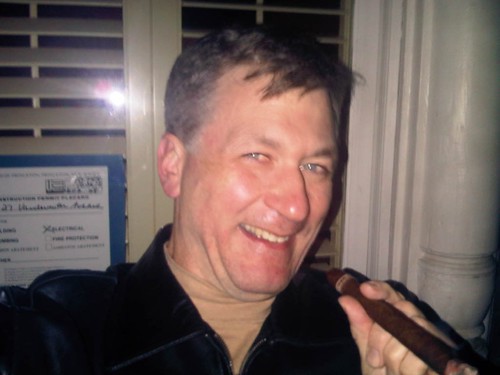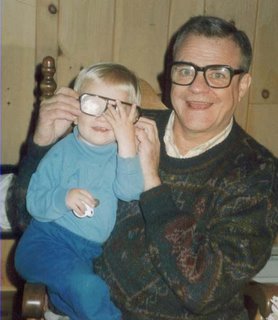Monday, November 01, 2010
The victory cigar

Regular readers know that my dear departed father's birthday was November 1, and I smoke my only cigar of the year on this day in his honor. What you do not know, however, is that he was a lifelong Giants fan, loyal to them even after they departed his native New York for San Francisco. Tonight, on what would have been his 75th birthday, they won their first World Series since 1954, when Dad was just turning 19. Tonight, the stogie in question was a victory cigar in his honor, and to the honor of the Giants of both coasts.
The original birthday post, which first went up four years ago, follows.

Regular readers know that I write about my father, the medieval historian John Bell Henneman, Jr., on the anniversaries of his death on July 7, 1998, and of his birth on November 1, 1935. Also, on every All Saint's Day I wander outside and smoke a hideous Garcia y Vega cigar. Dad smoked Garcia y Vegas and similar cheap cigars as long as I can remember, and the smell of them evokes strong memories. So I'm back in the house, stinking of cheap cigars, thinking about my father.
As it happens, earlier in the evening I stumbled across a paper given in memory of my father by the late, great professor of history at Dartmouth, Charles T. Wood. I remembered what a great friend Charlie Wood was to my father, and it also reminded me that there is an attenuated blogospheric connection: Professor Wood was an inspiration for at least a couple of the Power Line trio (and that made me think that my father would have loved Power Line).
My copy of Charlie Wood's paper, "Olivier de Clisson and Valois Biography," comes with a handwritten note across the top: "I can only hope this says things both fresh and familiar about your Dad. -- Charlie Wood." The first couple of pages does indeed include insights into my father as a young man and some medievalist "inside baseball" that might be interesting to amateur students of the period. There is also relevance for today's reader; even though Professor Wood wrote and delivered this paper in 1999, it contains observations that bear on controversies that have dominated the blogosphere during the Iraq war, including the problem of unemployed soldiers and the proper regard for the United States military waging a brutal counterinsurgency. Finally, Wood's paper derivatively explains me, even though most readers of this blog "know" me far better than Charlie Wood did.
If John Henneman's formal introduction to the Middle Ages came during his undergraduate years at Princeton, his preceptor there was Norman Cantor, not Joseph Strayer. I can't say whether that difference influenced John's intellectual development in any significant way, but I do know it had an impact on the speed and eagerness with which I tried to make his acquaintance after he entered graduate school. That is, following John's NROTC-mandated years of naval service, it was Norman, not Joe, who wrote his principal letter of recommendation to Harvard, and since, at that point, I was a member of its History Department, I can testify to the extent to which that letter served not just as a catalyst for John's admission, but also as a spur to my own desire to meet him. In particular, because Norman reported him to be "terribly nice," not the kind of assessment he made about fellow medievalists even then, that made me anxious to see just what it took to elicit such favorable words.
Still, because John had taken several of Strayer's courses before doing his doctorate under Charles Taylor, he naturally tended to think of himself as the student of both men. And that this belief had substance is nowhere better demonstrated than in the books on Valois taxation that Bill and Peggy have just discussed, for they are works whose intellectual ancestry clearly goes back to Studies in Early French Taxation, the monograph that Strayer and Taylor co-authored in 1939.
Nevertheless, if John gained his reputation as a French institutional historian concerned with Valois finance, that was not the person I met during his first days in graduate school. On the contrary, at that point he seemed more a disciple of Thomas Carlyle, a man deeply committed to the hero in history and hence also inclined to believe that only the great were worth studying. Understandably, given that outlook, he saw biography as his true metier, and he even predicted that the culmination of his career would come with publication of his definitive biography of Louis XI. Early on, at least, the model he hoped to emulate was Delachenal's five volumes on Charles V, a coverage that struck him as about right, though on more cautious days he thought that possibly he could do the Spider King in three.
Be that as it may, these opening remarks may provide a useful context for underestanding some of the personal background that helped to shape John's final book, Olivier De Clisson and Political Society in France Under Charles V and Charles VI. That he turned in the end to Clisson's career was in some senses a return to his earlier biographical vision, and that he chose to write about a military man seems in keeping with John's own beliefs, ones formed as much by his Virginia heritage as by naval service. It was that combined legacy, too, that had earlier undergirded what I can only call the unbending Henneman stubbornness with his he continued to defend the military even at the height of the Vietnam War. On the other hand, that this defense was far from blind is suggested by the simultaneous interest that some of his articles began to take in fourteenth-century routiers and echorcheurs -- undisciplined and out-of-control former mercenaries largely drawn from the impoverished nobility of France's north and west -- for this interest seems not unrelated to his attempts to come to grips with the growing indiscipline of an American army capable of massacres like My Lai. What made Clisson expecially interesting, I suspect, was the fact that, even though he came from this same nobility and was an exemplar of its extraordinary arrogance, he could at times transcend its limitations, possibly because he enjoyed extensive personal resources and recognized the extent to which military success depended on an army with clear goals and unmatched discipline.
While Charlie Wood's paper in memory of my father describes him primarily as an economic historian, in fact he revived his interest in military history when I was a teenager, mostly because I had become interested in during junior high (yes, I played war games, and yes, I belonged to the "Military History Book Club"). Eventually he taught a course in Western military history at the University of Iowa, where he spent the middle years of his career before coming to Princeton as History Bibliographer. Since his primary area of specialty was 13th and 14th century France, he knew a lot about routiers, the unemployed knights -- soldiers, actually -- who devestated Western Europe during that period. One of Dad's iron rules of history was that unemployed soldiers were very dangerous. Therefore, however supportive of the United States military Dad would have remained had he lived into his seventies, there is no doubt that he would have deplored Paul Bremer's decision to disband the Iraqi army without giving the soldiers some other job to do. Nevertheless, almost every day I wonder what he would have thought about the other various controversies that have washed over the American wars in the Muslim world. For that matter, I'm sure Paul Mirengoff and Scott Johnson would join me in wishing that they could hear what Charlie Wood and John Henneman thought about the American confrontation with radical Islam.
We love you, Dad.
6 Comments:
By Escort81, at Tue Nov 02, 12:16:00 AM:
A very moving tribute.
It shows your father's true inner fan that he stayed loyal to the Giants, even after the move to California. There certainly are no Athletics fans left in Philadelphia.
As painful as it is to say (coming from a Phillies fan), congratulations to the Giants and their fans, both in this world and the next. The team of self-described "misfits" among the position players went on one of those remarkable runs by an underdog that makes sports so special. What were the chances of Edgar Renteria being the World Series MVP this year, or Cody Ross being the LCS MVP after being waived by the Marlins?
By , at Tue Nov 02, 12:45:00 AM:
I have read this post for a few years running. It wears well. I'm sure it does not escape you what incredible good fortune came upon you.
M.E.
By TigerHawk, at Tue Nov 02, 06:51:00 AM:
By , at Tue Nov 02, 11:46:00 AM:
Oh my, so sad to lose your father at what seems such an early age. I was blessed to have my father until age 79, and your post causes me to reflect all the more on the final decade and a half that we enjoyed. We are shaped by our fathers and intensely fortunate to have good ones, as both you and I have. That's a lovely tribute to him, just remember you can honor his memory without actually inhaling those smokes :)
By , at Tue Nov 02, 02:08:00 PM:
Reading your annual tribute to your father does not grow old.
I also remember your postings on his response to those who wanted to shut down classrooms.
By , at Wed Nov 03, 08:45:00 AM:
Ditto to Boludo Tejano's post.



